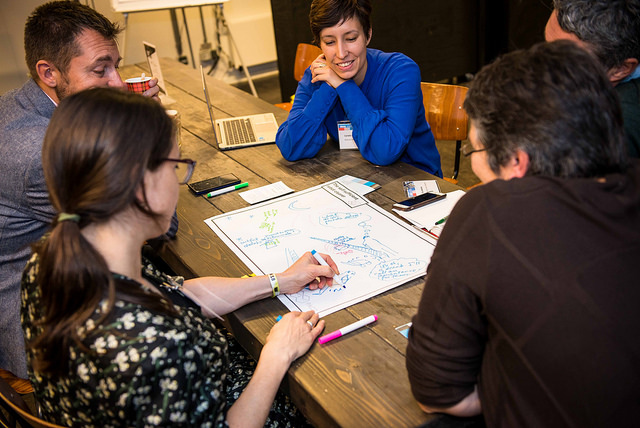
by Pattrasuda Parton | Oct 31, 2018 | updates
During Dutch Design Week, at the CLICKNL DRIVE festival, October 24 2018, PACT was invited to give a short one hour workshop: Envisioning Things as Citizens in Near Future Cities.
We used elements of longer workshop format we did before at Border Sessions, Master Digital Design and at IDC conference. As it was only one hour, we specifically shaped the workshop combining an introduction of PACT research program with interaction in the groups to explore what might be the implications of autonomous services in near future cities.
We had a nice group of about 25 participants, divided in four groups for the interactive part, after the introduction. Every group discussed one of the situations from a Future Scenarios paper we recently presented at NordiCHI [https://dl.acm.org/citation.cfm?id=3240273], with a focus on the interplay between human and non-human citizens and how this may affect future cities.
The participants, a mix of creative professionals and researchers,- were highly involved and interested in the topic. The use of simple examples of autonomous services for future cities made it possible to easily discuss relevant and challenging topics that we see as crucial in the design of human-nonhuman relationships. The workshop successfully enabled to move the discussion from a focus on the actual interplay between human-nonhuman entities, to a broader discussion about the societal impact of decisions we take about the future of our cities.
For more information : https://www.clicknl.nl/drive/envisioning-things-as-citizens-for-fostering-healthy-behaviours-in-near/
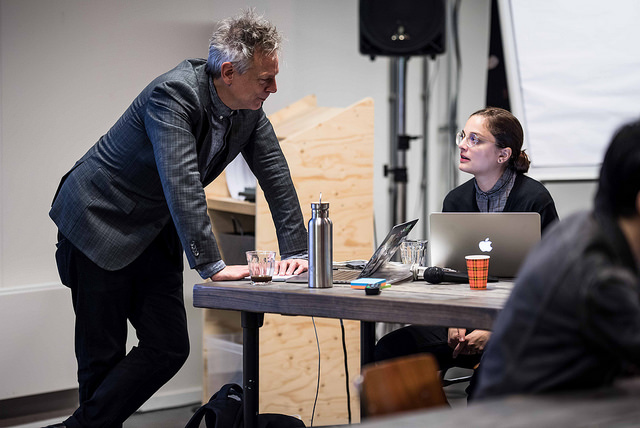
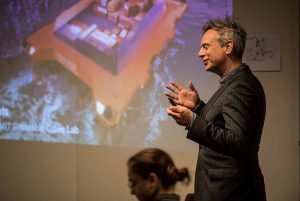
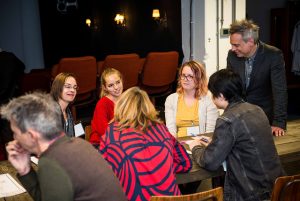
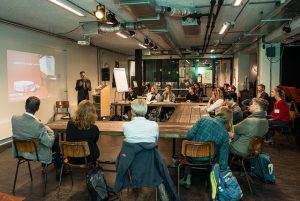
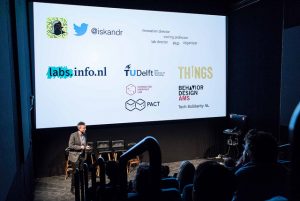
Photos by communicatie CLICKNL : https://www.flickr.com/photos/108619747@N08/sets/72157699822859742/
by iskander | Aug 9, 2018 | updates
The students from the master graduation project at Amsterdam University of Applied Sciences delivered a design for an autonomous bike. PACT commissioned this assignment in the special design master program that debuted last year at AUAS.
Y.O.L.O. bike is a speculative design project that focuses on the design of the embodiment of autonomous intelligence and its agency, applied to a bike in a futuristic context. The students imagined the future of biking, taking advantage of this context while augmenting the bike experience thanks to smart technologies, in order to make people meet in physical world again. We are introducing you to Y.O.L.O. well-being bike of the future.
See more on the bike and the research at http://yolobike.studio/the-project/
by iskander | Jun 1, 2018 | updates
At May 24 we were invited to held an Engage-session at The Next Web conference. This is one of the biggest conferences on tech, innovation in Europe and attracts about 15.000 people in two days to Westergasfabriek in Amsterdam.
Since 2006, TNW Conference has brought together the ecosystem of technology agents driving business innovation. Now in 2018, we’re expanding into 19 carefully curated tracks to shape a much deeper conversation on how technologies such as blockchain and AI will directly affect industries, professions and the way we innovate. Join us and 15.000 attendees on May 24 & 25 2018.
This year the conference created several tracks and formats for sessions. The track Machine:Learners
In the race to building a truly general artificial intelligence, narrow AI is already radically changing your business. At Machine:learners we discuss the current and future use cases for machine-, deep learning and neural science.
The Engage session we organised was themed on ‘Things That Think, new ways of living in future cities’.
With the rise of artificial intelligence the objects in our cities will get more agency. In the current paradigm smart cities are seen as dashboards. When intelligent objects start to populate our streets we get Cities of Things. The Things will have a role as citizens.
In this session insights from the research program PACT (Partnerships for Cities of Things) will be shared. With a special developed card game we invite you to discuss the consequences of these cities of intelligent things.
The Engage session is 45 minutes with a small group of people meant share thoughts and debate consequences. Maria Luce and Iskander Smit prepared a short presentation on the project and a set of cards with situations based on a future scenario, that makes it more tangible to discuss the consequences.

We had a diverse group of people from innovation consultants, user experience designers and investors. The discussions where interesting and touched some of the primal discussions. The cards worked very well to make it concrete.
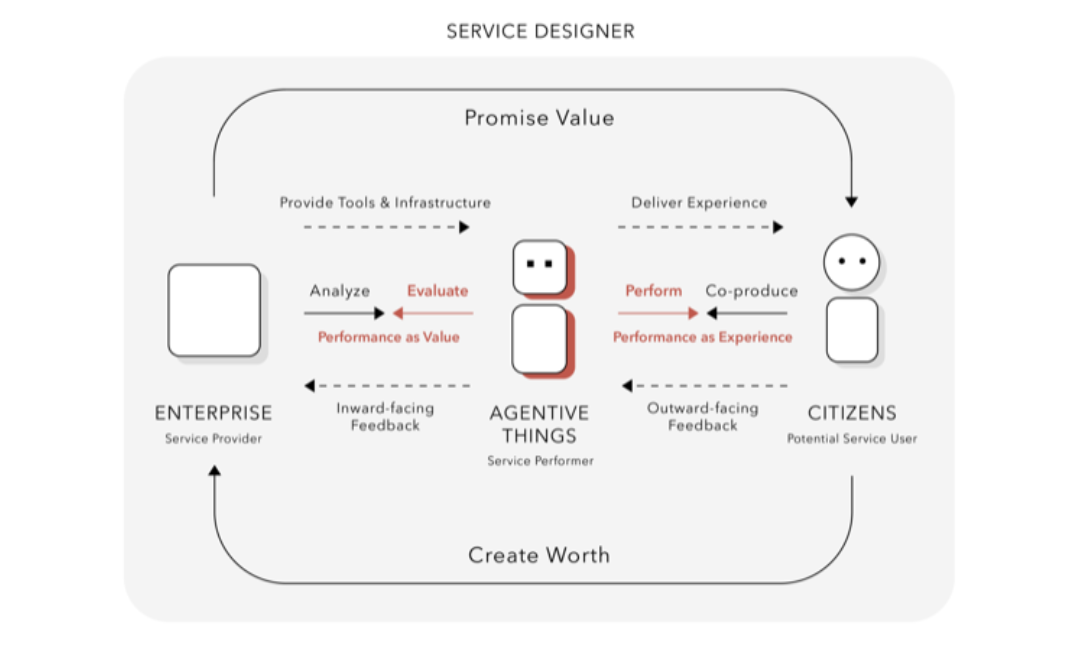
by iskander | Apr 3, 2018 | updates
In March 2018 Sen Lin started with his master graduation project in PACT. Title of his project is: Agentive Humanism: Designing Future Mobility Service with Agentive Things
Some backgrounds of the project.
With the rise of IoT and Artificial Intelligence, intelligent things as new actors with high agency will be involved in the digital modernity of cities towards a future vision so-called smart city. Among all the cutting-edge technologies, Agentive Tech emerges as a type of technology that does things on users’ behalf. This special characteristic stimulates new dialogue to occur such as co-performance and has lots of potential.
In pace with the technology booming, companies are busy developing new services powered by intelligent things. In this case service continues to expand in novel and unforeseen ways, and will deeply permeated everyday life along the backbone of agentive tech, giving rise to a new digital humanism: agentive humanism.
For tackling this issue, a service-design mindset which takes a comprehensive view of all the related actors, their interactions, supporting materials and infrastructures would be a suitable approach. The holistic perspective can help shift the attention from G-D to S-D logic, arousing more insights and discussion into a wider social and action context.
Assignment
In general, the assignment is to arrange the agentive empowerment of technology and different human values in the future mobility ecosystem and leverage it for better humanism within business world through service design.
The following issues are expected to be addressed in the assignment:
1. Future probe of smart city & mobility development and discover plausible visions
2. Exploration of the openness and capabilities of Agentive Tech as a kind of mechanism
3. Service ecosystem design of future mobility including ecology, scenario and experience aspects
4. Relate services to societal impacts and how they connect to individual experiences
5. Get insights and conclusions collected from evaluation of different audience (citizens, designers and company)
The project is planned to be completed mid August 2018. We keep you updated here!
by iskander | Dec 14, 2017 | updates
For her graduation project Louise Hugen did several workshops on her project designing for Things as Citizens.
At November 8 Louise has conducted research about the values of citizens: how would citizens like Things to act when Things get an agency?
She applied the research method Contextmapping and conducted this method with a focus group of IoT professionals that live in Amsterdam. Contextmapping is a method that is used to discover insights about the unconsciousness of people: their fears and dreams and their values. This research method consists of a sensitizing phase (a home study before the session) and a session during which participants discuss and create. Before the session, participants did a small home study to discover their values about people’s behavior in public spaces. During the session, three provotypes were shown to the participants. These three provotypes had an anti-social character which lead to a discussion by the participants. Based upon their opinions and thoughts, the participants decided together how ‘good Things’ should be designed and they started creating their own Thing with the desired characteristics.
At the moment Louise is processing the results of the session, which will be shown soon on the website as a follow up.
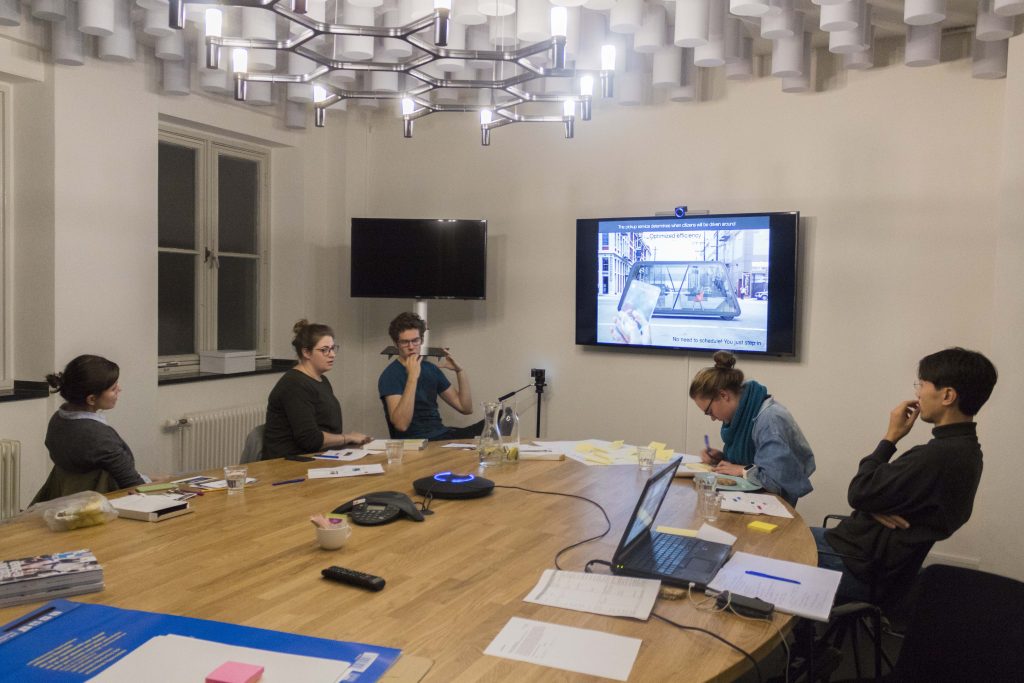
At ThingsCon Louise gave a workshop to ideate things as citizens.
During this workshop, demonstrators of Things as Citizens were shown for evaluation. Based upon these demonstrators, the attendees had an interactive session to evaluate how Things should be designed; how can they collaborate with citizens and contribute to human life?

The workshop was a success and delivered some new insights and confirmations on the theories of things as citizens design criteria.












